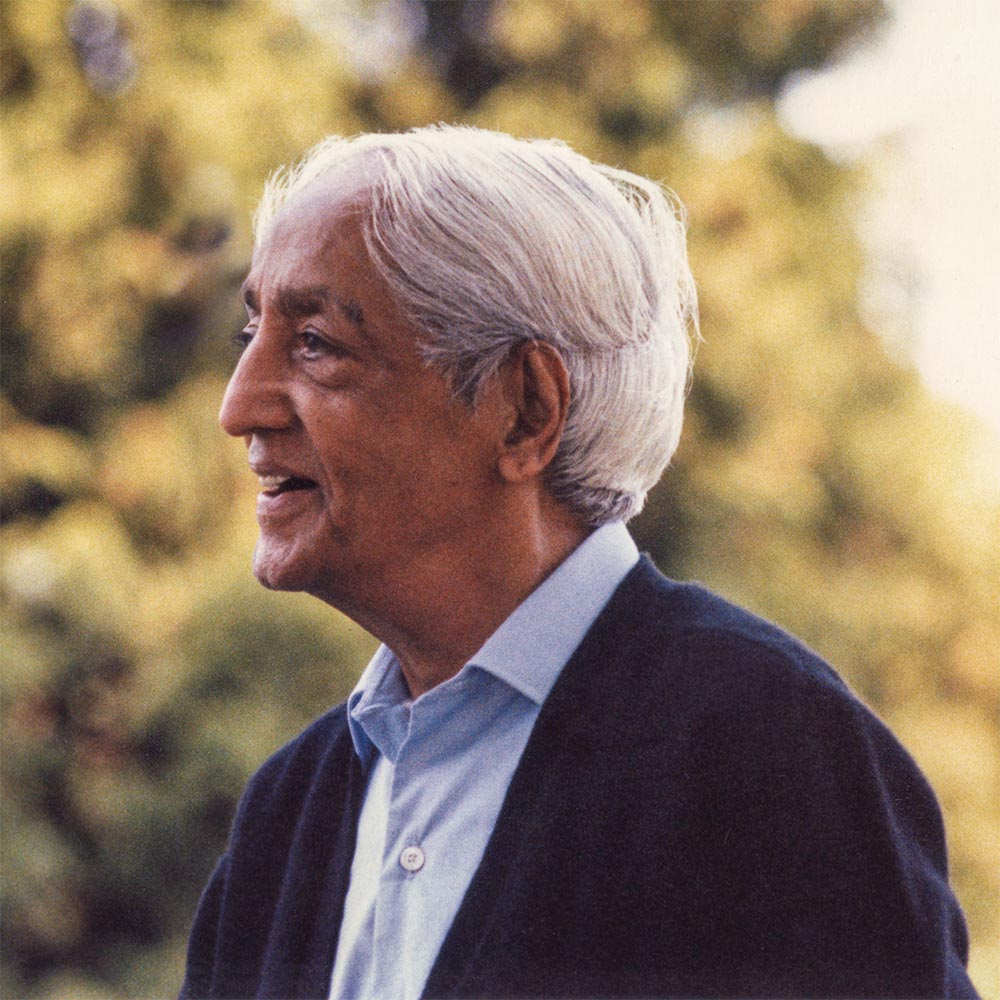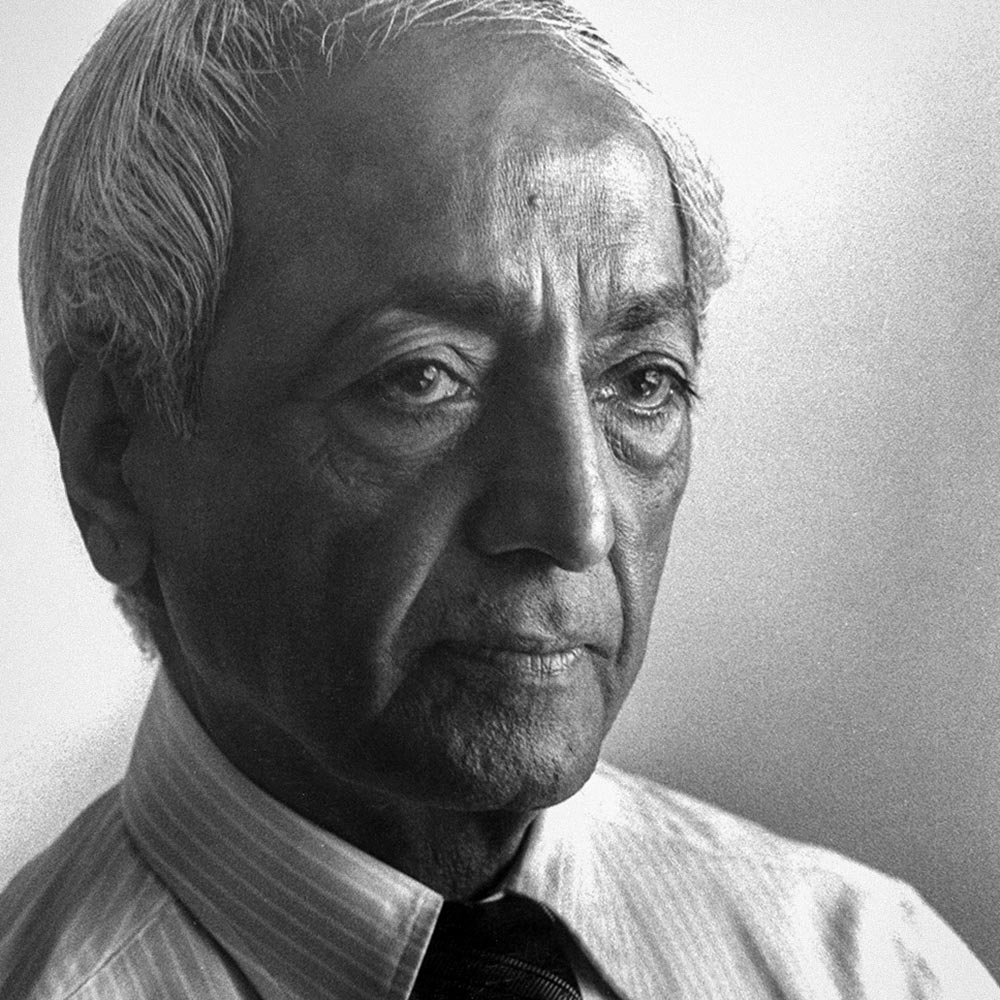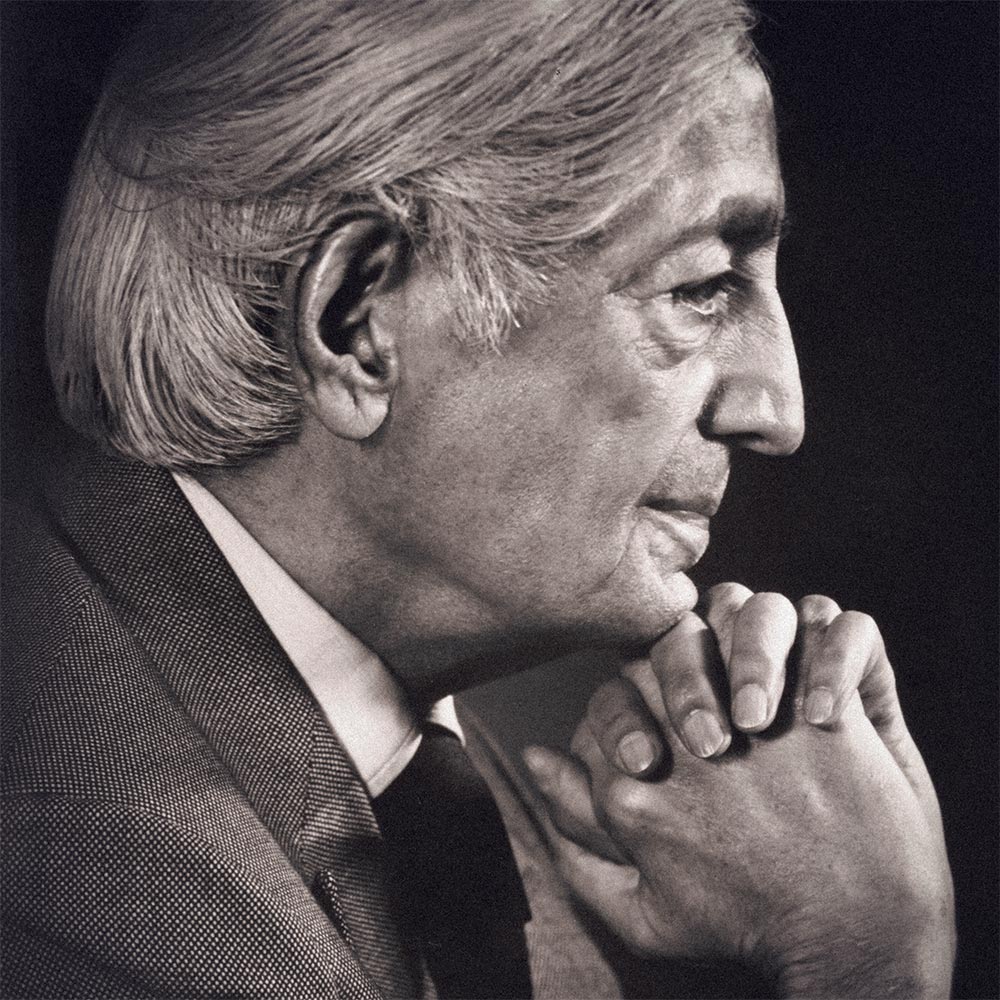Can love be divided into the sacred and the profane, the human and the divine, or is there only love? Is love of the one and not of the many?
Krishnamurti, Freedom From the Known
Read More
Love is something new, fresh, alive. It has no yesterday and no tomorrow. It is beyond the turmoil of thought.
Krishnamurti, Freedom From the Known
Read More
Love is always active present. It is not ‘I will love’ or ‘I have loved’.
Krishnamurti, Freedom From the Known
Read More
Fear is not love, dependence is not love, jealousy is not love, possessiveness and domination are not love, responsibility and duty are not love, self-pity is not love. Love is not the opposite of hate.
Krishnamurti, Freedom From the Known
Read More
Love is not sensation or pleasure; it is not the result of desire. It is something entirely different.
Krishnamurti, How to Find Peace
Read More
The thing we call love has really lost its meaning. When one says, ‘I love you,’ pleasure is abundant in this.
Krishnamurti, How to Find Peace
Read More
Love never strives after something; it does not make itself perfect. It is the flame without the smoke.
Read More
Love is not within the scope of man’s longing and measure.
Read More
Without love, do what you will, be as clever as you like, you will solve nothing.
Krishnamurti, How to Find Peace
Read More
Why do we choose the worse and not the better, why hate rather than love, why greed and not generosity? Why be mean when there are soaring mountains and flashing streams? Why jealousy and not love? Why?
Read More
When you love, everything will come right. Love has its own action. Love, and you will know the blessings of it.
Krishnamurti, Commentaries on Living 3
Read More
As we have no love, we cannot bring about a social structure free of conflict and misery.
Krishnamurti, Life Ahead
Read More
Love alone can transform the present madness and insanity in the world – not systems, not theories, either of the left or of the right.
Krishnamurti, The First and Last Freedom
Read More
Love is a dangerous thing; it brings the only revolution that gives complete happiness.
Krishnamurti, Happy Is the One Who Is Nothing
Read More
To love is to be aware of eternity.
Krishnamurti, Happy Is the One Who Is Nothing
Read More
These quotes only touch on the many subjects Krishnamurti inquired into during his lifetime. His timeless and universal teachings can be explored using the Index of Topics where you will find texts, audio and video related on many themes. Another option is to browse our selection of curated articles or more short quotes. Krishnamurti’s reply when asked what lies at the heart of his teachings can be found here. Many Krishnamurti books are available, a selection of which can be explored here. To find out more about Krishnamurti’s life, please see our introduction and the biography. We also host a weekly podcast, and offer free downloads. Please visit our YouTube channel for hundreds of specially selected shorter clips. Below, you can learn more about Krishnamurti and our charity which he founded in 1968.

Who Was Krishnamurti?
J. Krishnamurti (1895-1986) is widely regarded as one of the greatest thinkers and religious teachers of all time. He spoke throughout the world to large audiences and to individuals, including writers, scientists, philosophers and educators, about the need for a radical change in mankind. Referring to himself, Krishnamurti said:
He is acting as a mirror for you to look into. That mirror is not an authority. It has no authority, it’s just a mirror. And when you see it clearly, understand what you see in that mirror, then throw it away, break it up.
Krishnamurti was concerned with all humanity and held no nationality or belief and belonged to no particular group or culture. In the latter part of his life, along with continuing to give public talks, he travelled mainly between the schools he had founded in India, Britain and the United States, which educate for the total understanding of man and the art of living. He stressed that only this profound understanding can create a new generation that will live in peace.
Krishnamurti reminded his listeners again and again that we are all human beings first and not Hindus, Muslims or Christians, that we are like the rest of humanity and are not different from one another. He asked that we tread lightly on this earth without destroying ourselves or the environment. He communicated to his listeners a deep sense of respect for nature. His teachings transcend man-made belief systems, nationalistic sentiment and sectarianism. At the same time, they give new meaning and direction to mankind’s search for truth. His teaching is timeless, universal and increasingly relevant to the modern age.
I am nobody. It is as simple as that. I am nobody. But what is important is who you are, what you are.
Krishnamurti
Krishnamurti spoke not as a guru but as a friend. His talks and discussions are based not on tradition-based knowledge but on his own insights into the human mind and his vision of the sacred, so he always communicated a sense of freshness and directness, although the essence of his message remained unchanged over the years. When Krishnamurti addressed large audiences, people felt that he was talking to each of them personally, addressing their own particular problem. In his private interviews, he was a compassionate teacher, listening attentively to those who came to him in sorrow, and encouraging them to heal themselves through their own understanding. Religious scholars found that his words threw new light on traditional concepts. Krishnamurti took on the challenge of modern scientists and psychologists and went with them step by step, discussing their theories and sometimes enabling them to discern the limitations of their theories.
Krishnamurti left a large body of literature in the form of public talks, writings, discussions with teachers and students, scientists, psychologists and religious figures, conversations with individuals, television and radio interviews, and letters. Many of these have been published as books, in over 60 languages, along with hundreds of audio and video recordings.

The Krishnamurti Foundation
Established in 1968 as a registered charity, and located at The Krishnamurti Centre, Krishnamurti Foundation Trust exists to preserve and make available Krishnamurti’s teachings.
The Foundation serves a global audience by providing worldwide free access to Krishnamurti videos, audio and texts to those who may be interested in pursuing an understanding of Krishnamurti’s work in their own lives.
In describing his intentions for the Foundations, Krishnamurti said:
The Foundations will see to it that these teachings are kept whole, are not distorted, are not made corrupt.

